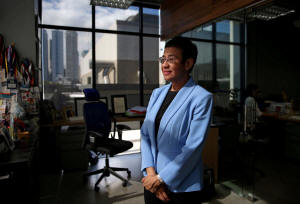Philippine journalist's Nobel called 'rebuke' to Duterte, who remains
silent
 Send a link to a friend
Send a link to a friend
 [October 09, 2021]
By Neil Jerome Morales [October 09, 2021]
By Neil Jerome Morales
MANILA (Reuters) - The Nobel Peace Prize
for Philippine journalist Maria Ressa was hailed by many at home on
Saturday as a rebuke on official attacks on the media, but there was no
comment from President Rodrigo Duterte, a frequent critic of Ressa's
news site.
Ressa, who is free on bail as she appeals a six-year prison sentence
last year for a libel conviction and has faced a slew of other court
cases, shared the prize with Russian investigative journalist Dmitry
Muratov.
Duterte has described Rappler news site that Ressa co-founded as a "fake
news outlet" and a tool of the U.S. Central Intelligence Agency.
Rappler, launched in 2012, has challenged Duterte's policies and the
accuracy of his statements. Its investigations have included a spate of
killings by law enforcement during a war on drugs Duterte launched when
he took office in June 2016.
Rights group says authorities summarily executed thousands of drugs
suspects. The police deny this, saying those killed violently resisted
arrest in sting operations.

Lawmakers and media experts said the award highlights the importance of
free speech and speaking truth to power ahead of next year's elections
to choose Duterte's successor.
Carlos Isagani Zarate, an opposition lawmaker, said the government is in
an awkward position.
"The deafening silence from the palace speaks volumes on how they
treated Maria Ressa in the past and how they were taken aback by this
recognition," Zarate told Reuters. "This is a personal rebuke on Duterte
who was insulting critics, especially women."
Ressa is the first Filipino to individually win a Nobel - 13 Filipinos
were in organisations that received the prizes in 2017, 2013 and 2007.
PALACE DILEMMA
"For the palace, the dilemma is how to congratulate someone who is a
victim of persecution by the government," Danilo Arao, a journalism
professor at the University of the Philippines, told Reuters.
[to top of second column]
|

Maria Ressa, an executive of online news platform Rappler, poses at
Rappler's office in Pasig City, Metro Manila, in Philippines,
December 3, 2018. REUTERS/Eloisa Lopez//File Photo

Duterte's government denies persecuting critics in
the media.
The presidential palace, Duterte's spokesperson, his chief legal
counsel, and communications office did not respond to Reuters
requests for comment on Ressa's award or on critics' reactions.
Justice Secretary Menardo Guevarra welcomed Ressa's win but said
libel laws would be upheld.
"As an ordinary Filipino, I am happy that a fellow Filipino has been
included in this year’s roster of Nobel Peace laureates," Guevarra
said in a statement.
He said freedom of expression is constitutionally guaranteed in the
Philippines but there are legal limits, including libel and
defamation.
"Prosecutorial discretion will always be guided by these legal
principles and the facts obtaining in any given case, regardless of
the persons involved," Guevarra said.
In 2018, Duterte banned Rappler from covering his official events,
prompting the news site to cover event speeches and activities via
live television and social media.
Several well-wishers said the Nobel highlights the importance of the
media, truth and democracy ahead of Duterte ending his six-year term
in June.
Ressa's prize highlights the importance of protecting freedom of the
press "as our vanguard against abuse of power, and an essential
element of democracy," the Management Association of the
Philippines, one of the premiere business groups, said in a
statement.

(Reporting by Neil Jerome Morales; Editing by William Mallard)
[© 2021 Thomson Reuters. All rights
reserved.] Copyright 2021 Reuters. All rights reserved. This material may not be published,
broadcast, rewritten or redistributed.
Thompson Reuters is solely responsible for this content. |